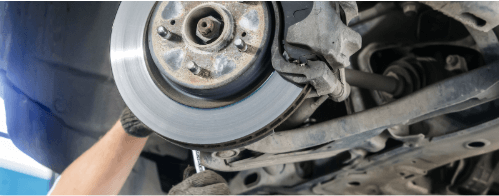What do brake pads have in common with engine oil and air filters? Well they, along with tire rotations and a number of other service items, are all candidates for routine maintenance on your car, truck, or SUV. Each of them is essential to keeping your vehicle running safely and smoothly on the road. So, your vehicle manufacturer recommends servicing each item regularly according to a maintenance schedule.
Your brake pads need to be replaced every so often – usually somewhere around fifty thousand miles (give or take according to your driving habits). That is because the friction material applied to them wears away with use. When your brake pads wear too thin to be used safely (somewhere between 3-6mm), it is time for a brake inspection or change.
As a driver, you already know that your brakes are the most important safety feature of your vehicle. And you probably understand that the brake pads need to be replaced periodically. But what about your brake rotors? Do they need to be serviced as well? And if so, can they be resurfaced, or do they need to be replaced?
What is a brake rotor?
A brake rotor is a component of the disc brake system featured on most vehicles on the road today. The rotor is a heavy metal disc that connects your wheel to the wheel hub. When the wheel and tire rotate, the rotor spins along with them. Your brake pads are sandwiched around the rotor. When you press on your brake pedal, a hydraulic clamping mechanism (called a brake caliper) squeezes the brake pads against the sides of the rotor, creating friction to slow and stop your car.
Over time and with use, the friction material on your brake pads, which can be composed of organic, semi-metallic, or ceramic materials, will wear away. That is why you need to replace your brake pads regularly.
While your rotors are not necessarily designed to be sacrificial like the brake pads, they too will wear down. They become thinner. And excessive heat from aggressive braking or hauling heavy loads can lead to glazing and hot spots on your rotors. The lifespan of a rotor is affected by the type of brake pads you use (semi-metallic pads wear at a rotor more than organic or ceramic pads), the amount of exposure they receive to salt and moisture, and your driving style. If you tend to ride your brakes or drive aggressively, your rotors will wear faster. The quality of the rotors can also affect how long they last. So your rotors need to be serviced as well.
What is rotor resurfacing?
Traditionally, brake rotors were machined, or resurfaced, each time new brake pads were installed. That means a technician would measure the rotors to see if they met the minimum thickness recommended by the manufacturer. If they did, and if they had enough material left for resurfacing, the technician would disassemble the brakes, remove the rotors, install them on a machine (brake lathe), and remove just enough material to make them smooth again and spin true.
But brake rotors of the past were heavy and thick. They had enough material thickness to undergo multiple resurfacing events, therefore lasting through several brake pad replacements. The rotors of today’s vehicles, like the ones on your car, are made to be lighter. That means they are thinner than rotors of yesteryear and often do not have enough margin for resurfacing. So rotor resurfacing, though still performed frequently (in fact, new machines, such as on-car brake lathes make the process more efficient and precise), is not quite as common as in the past. Still, if a rotor is determined to have sufficient thickness for resurfacing and is not warped or cracked, resurfacing is still an option.
Replacing vs. Resurfacing
When is resurfacing an option? When a technician measures a rotor and finds that the tolerances are within an acceptable limit for the procedure. Otherwise, replacement is necessary.
But sometimes replacing a rotor is a better option from the start. For instance, the cost of many rotors today is far less than in the past. It is often more economical to simply replace a rotor than to have it resurfaced, saving you time and money. Or in the case that you neglected the warning signs that your brake pads needed to be replaced, leaving your rotors damaged from grinding metal to metal contact. Those severely damaged rotors usually need to be replaced, not resurfaced.
Some vehicle manufacturers even require that you replace your rotors rather than resurface them. Otherwise, most industry experts suggest that you should replace them every 30-70K miles. In any case, if the rotors are beyond resurfacing, replacement is your only option. Then again, of course, it may be your best option anyways.
If your vehicle is in need of disc brake service, have a qualified technician at a trusted repair shop evaluate the brake system and measure the rotors. If they show no signs of cracking or severe damage, and if they have sufficient material for resurfacing (and if the manufacturer allows it), your technician may recommend resurfacing. If, on the other hand, your rotors are too thin or too damaged – or if resurfacing just doesn’t make monetary sense – you will probably need to replace them.
